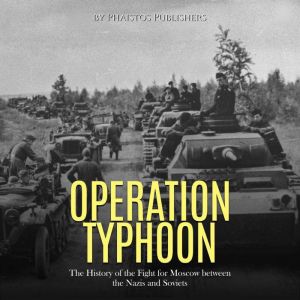
List: $6.95
| Sale: $4.87
Club: $3.47
Operation Typhoon: The History of the Fight for Moscow between the Nazis and Soviets
Author: Phaistos Publishers
Narrator: Colin Fluxman
Unabridged: 1 hr 24 min
Format: Digital Audiobook Download
Publisher: Phaistos Publishers
Published: 01/28/2023
Category: History - Military - World War Ii
Synopsis
After the Fall of France and the unsatisfactory Battle of Britain came to a close, Hitler turned to the east and issued Fuhrer Directive 21, his secret order for the invasion of the Soviet Union, on 18 December 1940. Prior to this the Molotov-Ribbentrop Pact, a non-aggression agreement, had enabled the two countries to divide the spoils after the invasion of Poland that had triggered the Second World War. Hitler, however, had always regarded this agreement as nothing more than a temporary tactical maneuver. In the early part of the Second World War, the arrangement had suited the two nations, with the Soviet Union preoccupied with its own issues while Hitler continued his aggression in Western Europe, exporting manufactured goods to the Soviet Union in return for grain and oil. But they were never easy bedfellows since their ideological differences were diametrically opposed.For his part, Stalin seems uncharacteristically trusting of Hitler despite Soviet intelligence reports and London warning him of Germany’s intentions. Operation Barbarossa caught him unprepared. Over three and a half million troops - eighty% of the German Army, attacked along a front almost 3,000 km, supported by 2,700 aircraft, the largest invasion force ever seen. Soviet forces were hastily dispatched to the frontier in huge numbers, but the Germans pushed through quickly and decisively, and within three weeks of the launch of Operation Barbarossa, Hitler’s initial objectives had been achieved. While a legend exists today that Hitler's strategic fecklessness destroyed Germany's chances, despite the wise objections of the Wehrmacht general staff (OKW), the actual situation in 1941 resembled the precise reverse of this familiar historical trope. It seems the Fuhrer retained his full strategic acumen in 1941, until he ill-advisedly adopted the suggestions of the OKW and diverted forces in a winter campaign to seize the Soviet capital, leading to the Battle of Moscow .